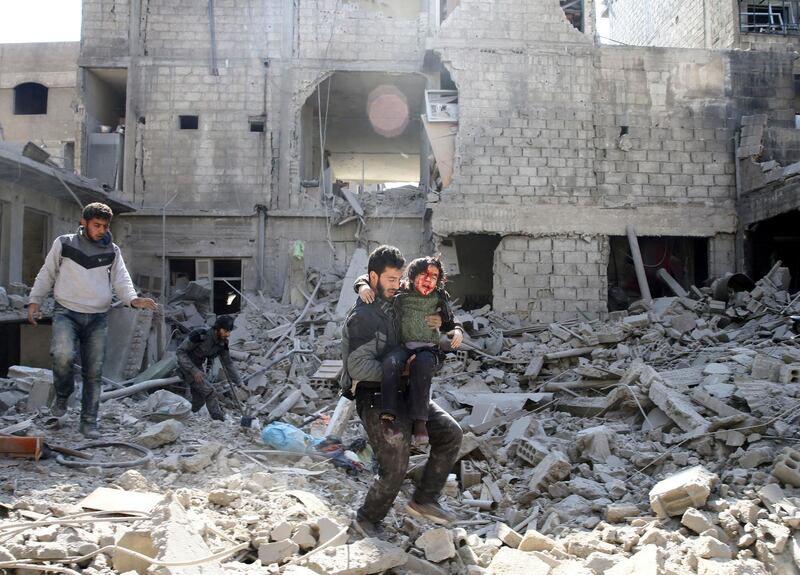After a week of the most relentless bombardment of civilians since the Syrian war began, the time for inaction is over. Besieged Eastern Ghouta is currently a living hell, with more than 300 killed since Sunday by Syrian regime barrel bombs targeting hospitals, schools and homes, pushing most of the area's 400,000 residents underground in fear for their lives. Bashar Al Assad is determined to put all dissenters in the ground permanently and has laid siege to Eastern Ghouta – one of the last rebel enclaves – since 2013, blanketing it with sarin gas and barrel bombs with clear disregard for the value of human life. Rebels have reportedly retaliated with shells killing more than a dozen in Damascus this week. Today more than three million Syrian children know nothing but war. There was some cause for hope when ISIL was driven out but the fragile coalition that flushed out the extremists is no more. Its participants have turned on each other – and the devastation of Eastern Ghouta is the latest war crime in the escalating fallout.
Once again the UN Security Council and its affiliates have reached an internal impasse, brought about by its member states only seeking to protect their own interests. Mr Al Assad's backing from his Russian sponsors has given him assurances of impunity amid international condemnation. His claims that rebels are using civilians as human shields simply adds to the maelstrom of fake news and propaganda that has prompted many to look away as innocent civilians cling on in death's waiting room.
The compound failures of international powers and institutions in Syria have all played a role in the bloodshed. It is the very signatories of treaties like the Geneva Conventions that are flouting international humanitarian law in the country for their own gains. Whatever became of the “responsibility to protect”, the political commitment to shield civilians following atrocities in the Balkans and Rwanda in the 1990s? In protracted and complex wars, there is a tendency to avert one’s eyes. But as Eastern Ghouta burns, condemnation and hand-wringing from leaders and those who think a hashtag is enough to effect change must give way to action.
Peaceful protests helped bring the 19-year Vietnam War to an end. Citizens of the chief protagonists in the Syrian war are increasingly demanding answers about their leaders' foreign meddling, among them the families of Russian mercenaries killed in Deir Ezzor, Iranian protesters enraged by Tehran's involvement and dissenters in Turkey. The UAE led its own call for an immediate truce today. The rest of the world should follow suit because taking no action is a statement in itself. That action can take many forms, whether it is by donating to reputable aid organisations, lobbying politicians or supporting displaced Syrians. Mr Al Assad needs to know his actions bring repercussions. To turn away now and declare Syria a lost cause is to replicate the cowardice of its many assailants.





